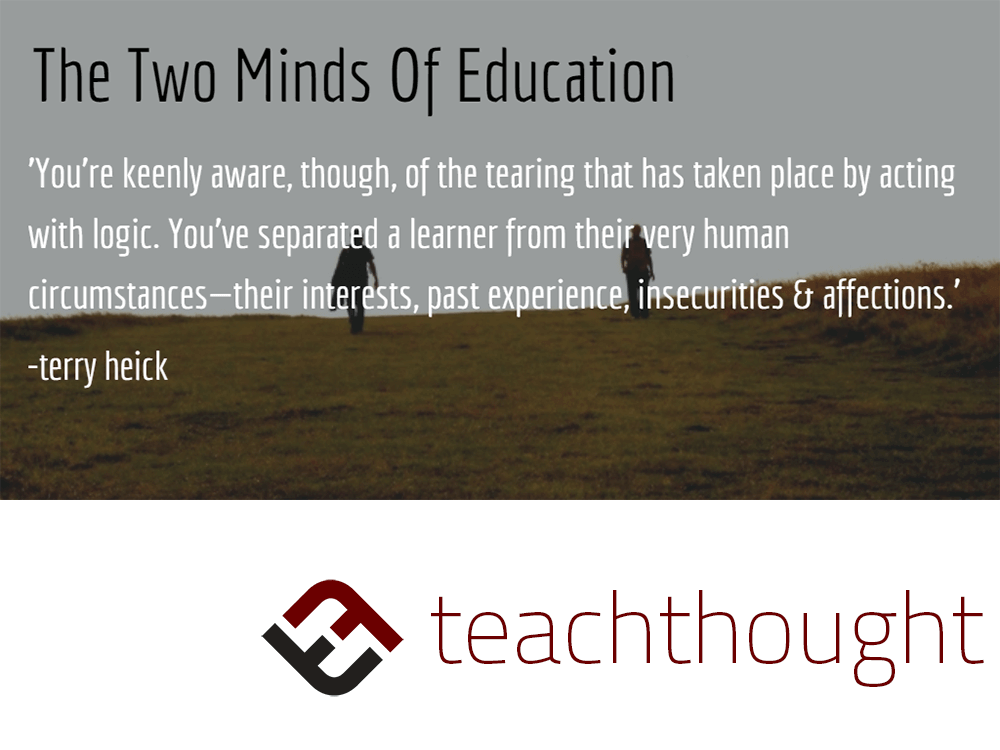
by Terry Heick
In his test Two mindsWendell Berry, not surprisingly, offers two tones of thought produced by two types of “mental” – rational and sympathetic.
One is motivated by logic, deduction, data and measurement, the other by affection and other unnecessary abstractions – instea, reverence, joy and faith. These spirits find it difficult to manifest themselves in our collective behavior. In other words, they both seek to control our actions – what we say and do.
Berry explains their distinctions:
“The rational spirit of is motivated by the fear of being misleading, of being false. Its purpose is to exclude everything that cannot be proven empirically or experimentally.
The sympathetic spirit is motivated by the fear of the error of a very different type: the error of negligence, to be without love. Its purpose is to be attentive to everything that is present, to leave nothing aside. »»
It is not surprising that these two minds also exist in education. These are instincts that you have probably had as a educator – a teacher, an administrator, a developer or a designer. Probably as a parent also if you have children. The need to be rational and deductive and strategic collide with the enormous complexity and the scale of the circumstances you face.
You are told to be based on data, that is to say to design an learning experience with “strategies” suggested by certain measures that you have taken.
You could plan lessons and units by wondering why this educational strategy? Why this evaluation form? Why meet at this stage of the lesson rather than this point? Why this standard with this novel?
It is your rational mind.
But your rational mind is a servant in another type of thought – in fact, is awake and stimulated by a kind of insecurity which achieves this undoubted importance and coinciding the impossibility of what you have done with the work of your life: teaching dozens and dozens of other human beings to know (insert your field of content here).
The rational spirit (the same spirit that stimulates policies and standards) wants to analyze this task – respond with logical. Preventively, strategic and analytical.
So rather than worry that this student Impossible to read And this student is a brilliant artist ready for a professional mentor to promote his gift and this student needs both a hug and a self -knowledge than content knowledge, you answer analytically. Your rational mind takes over.
You look at the standards and graphics with bar and the broken books of Marzano and Hattie who list the educational strategies which, according to their rational minds, will work. You listen to your colleagues, your educational coach and any other person wishing to advise you. Then, you teach, evaluate, re -read, re -evaluate, remedy, extend and move on.
You are very aware, however, of the tear that took place by acting with logic. You have separated a learner from their very human situation – their interests, their past experience, insecurity and conditions.
Academic content of their native scheme.
Control of curiosity.
Scientific concepts of the application of science.
Level of reading the love of reading.
The rational spirit necessarily excludes curiosity, love, affection and joy because they are intrinsically irrational. We live in an era of information which itself proceeds in an era of lights. By design, data and rationality cannot tolerate abstraction and humanity or they were shaking in confusion.
But that requires an adjustment on our part. We have to stop being obstinate to what we see more and more in our students. Apathy. Distraction. Superficial character.
As an industrial, we are not only motivated but dangerously concerned about research and science and what is measurable and observable, having set up our profession of superstitions such as “patience”, “self -knowledge” and the “community”.
We leave teachers to stamp the collision between students in policies or sterile academic standards with communities that need more than the skills of students. But if we are “considerate of everything that is present” and we want to “leave nothing”, we can now see that pure rationality is not entirely a “mind”, but an instinctive reaction on the scale of our task.
A challenge for you and I can then be to raise a teaching beyond singularities through a kind of marriage – by partying our rational and sympathetic spirit in something inclusiveness, awake and whole.
Always insisting, whatever happens, that we do not resort to rationality or even sympathy, but we act rather as “whole teachers” in each of our interactions with and analyzes of students, and in doing so, model the significant practice of human being for them.
Image attribution Flickr User Nasa Goddard Space Flight Center; Become a “whole teacher”



